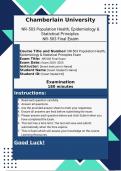Chamberlain University
NR- 503 Population Health, Epidemiology &
Statistical Principles
NR- 503 Final Exam
Course Title and Number: NR-503 Population Health,
Epidemiology & Statistical Principles Exam
Exam Title: NR-503 Final Exam
Exam Date: Exam 2024- 2025
Instructor: [Insert Instructor’s Name]
Student Name: [Insert Student’s Name]
Student ID: [Insert Student ID]
Examination
180 minutes
Instructions:
1. Read each question carefully.
2. Answer all questions.
3. Use the provided answer sheet to mark your responses.
4. Ensure all answers are final before submitting the exam.
5. Please answer each question below and click Submit when you
have completed the Exam.
6. This test has a time limit, The test will save and submit
automatically when the time expires
7. This is Exam which will assess your knowledge on the course
Learning Resources.
Good Luck!
Need Writing Help? We've Got You Covered! ✍️
100%
NO AI or Plagiarism Usage Guaranteed🎯
💬 Chat with us here: 📧 Hybridgrades101@gmail.com
, NR-503 Population Health, Epidemiology & Statistical
Principles 2024-2025
NR-503 Final Exam Practice Questions and Answers |
100% Pass Guaranteed | Graded A+ |
Read All Instructions Carefully and Answer All the
Questions Correctly Good Luck: -
Disaster epidemiology - Answer>> the use of
epidemiology to assess the short and long term
adverse health effects of disasters and to predict
consequences of future disasters. It brings together
various topic areas of epidemiology including acute and
communicable disease, environmental health,
occupational health, chronic disease, injury, mental
health and behavioral health
World Health Organization - Answer>> Primary goal is
to direct international health within the United Nations
system and to lead partners in global health responses
SDG's - Answer>> Universal call to action to end
poverty, protect the planet, and ensure that all people
enjoy peace and prosperity
SDG's list - Answer>> - No poverty
- Zero hunger
- Good health and wellbeing
- Quality education
- Gender equality
- Clean water and sanitation
- Decent work and economic growth
- Peace, justice and strong institutions
Need Writing Help? We've Got You Covered! ✍️
100%
NO AI or Plagiarism Usage Guaranteed🎯
💬 Chat with us here: 📧 Hybridgrades101@gmail.com
,Health effects of climate change - Answer>>
Cardiovascular and respiratory effects, Drowning,
injury, GI illness, wound/ blood infections, vector-born
illness, malnutrition, poverty, distress, grief, behavioral
and social health consequence due to increasing
temperatures, extreme weather, desertification, and
flooding
Cultural Awareness - Answer>> :Self-examination of
one's own prejudices and biases toward other cultures.
An in-depth exploration of one's own cultural/ethnic
background.
Cultural competence in nursing consists of four
principles. - Answer>> Care is designed for the
specific client.
Care is based on the uniqueness of the person's culture
and includes cultural norms and values.
Care includes self-employment strategies to facilitate
client decision making to improve health behaviors.
Care is provided with sensitivity and is based on the
cultural uniqueness of clients.
The APN may also use the Kleinman Explanatory Model
of Illness (1978). Below are the questions that can be
utilized. - Answer>> What do you call your problem?
What do you think caused your problem?
Why do you think it started when it did?
What does your sickness do to you?
What do you fear most about your sickness?
What are the chief problems your sickness has caused
you?
What kind of treatment do you think you should
receive?
Need Writing Help? We've Got You Covered! ✍️
100%
NO AI or Plagiarism Usage Guaranteed🎯
💬 Chat with us here: 📧 Hybridgrades101@gmail.com
, What is the most important result you hope to receive
from the treatment?
According to Giger and Davidhizer (2000), although
cultures differ, they all have the same basic organizing
factors that must be assessed in order to provide care
for culturally diverse patients. These factors include -
Answer>> communication (verbal and nonverbal);
personal space;
social organization;
time perception;
environmental control; and
biological variations.
The NCCC uses four major approaches to fulfill its
mission, including - Answer>> Web-based technical
assistance, (2) knowledge development and
dissemination, (3) supporting a community of learners,
and (4) collaboration and partnerships with diverse
groups.
Epidemiological Triad: - Answer>> host, agent,
environment
Genetics - Answer>> The study of individual genes
and their impact on relatively rare single gene
disorders
Absolute risk - Answer>> is the probability of an
event, such as illness, injury, or death. Gives no
indication of how its magnitude compares with others
The odds ratio - Answer>> closely approximates the
relative risk if the disease is rare.
Need Writing Help? We've Got You Covered! ✍️
100%
NO AI or Plagiarism Usage Guaranteed🎯
💬 Chat with us here: 📧 Hybridgrades101@gmail.com




